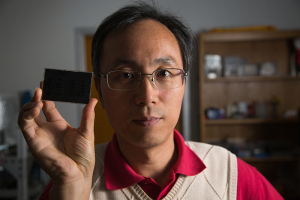Bao recognized for discovery, contributions and the development of new nanomaterials
Jiming Bao, professor of electrical and computer engineering at the UH Cullen College of Engineering, was elected a Fellow of the American Physical Society (APS).
According to the APS notification letter, Bao was selected for his “discovery of photoacoustic laser streaming, contributions to the understanding of basic electronic and optical properties of nanostructured materials, and the development of new nanomaterials for applications in solar energy conversions and optoelectronic devices.”
The number of APS fellows elected each year is limited to no more than one half of one percent of the membership.
“I’m honored by this recognition from my peers,” said Bao, referring to his election as an important career milestone. “This makes me feel that I have made valuable contributions to the science of our community.”
Bao’s research focuses on new and novel materials, semiconductor nanowire optoelectronics, silicon photonics and metallic nanostructures for plasmonics, solar water-splitting, and fiber optic sensors.
He was leading a UH research team studying the nonlinear transmission of light through an aqueous suspension of gold nanoparticles when they noticed something unexpected: a pulse laser appeared to have forced the movement of a stream of liquid in a glass laboratory cuvette. This observation led to a new optofluidics principle in 2017.
Earlier this year, Bao led a research team that developed a new laser-driven photoacoustic microfluidic pump, capable of moving fluids in any direction without moving parts or electrical contacts.
“Whenever I publish new findings or discoveries from my lab, I feel very happy,” Bao said. “That’s the most rewarding aspect of my career.”
In 2018, Bao was elected a Fellow of the Optical Society of America. In 2012, he won a National Science Foundation CAREER Award to study the optical properties of graphene. This year, he’s won a Welch award to continue studying cobalt oxides as viable catalysts for energy generation.
Bao earned both his bachelor’s and master’s degrees in physics from the Zhejiang University in Hangzhou, China. Then he went onto earn his Ph.D. in applied physics from the University of Michigan. He served as a postdoctoral fellow and a research associate on the research team of Federico Capasso at Harvard University from 2003 to 2008.
Founded in 1916, APS is a nonprofit organization working to advance and diffuse the knowledge of physics through its outstanding research journals, scientific meetings, and education, outreach, advocacy and international activities. It represents over 55,000 members, including physicists in academia, national laboratories, and industry in the United States and throughout the world. For more information, visit: https://www.aps.org/
